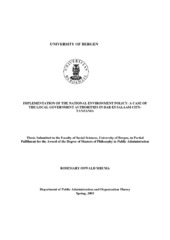Implementation of the National Environment Policy: A case of the Local Government Authorities in Dar Es Salaam City- Tanzania
Master thesis

View/
Date
2005Metadata
Show full item recordCollections
- Department of Government [467]
Abstract
The government of Tanzania, with the support of a wide range of donors is implementing Local Government Reform Programmes. The three municipal councils of Ilala, Temeke and Kinondoni are among the Local government institutions in the 1st phase of the programme. The programme is one of the decentralized measures to improve service delivery at the local level, which includes management of the environment. The programmes are aimed at replacing the former control and command system of central government with a decentralized system that allocates authority and responsibility to local authorities. The study is concerned with the process of the implementation of the National Environment Policy (NEP) in the decentralised Local Government Councils in Dar es Salaam, Tanzania. It analyses whether the shift of central government power to decentralised government units at the municipal level results, in successful implementation of public policies, especially the National Environment Policy. The study is a comparative, case-oriented one in which Ilala; Kinondoni and Temekemunicipalities are the cases. Qualitative approach of doing social research was employed in which interviews were conducted in the data collection phase. In examining the implementation of NEP, both top-down and bottom-up approaches are used. In the top-down approach the analysis is presented by looking at the policy itself and examines the extent to which objectives of the National Environment policy are achieved/not achieved across cases and possible explanations for the outcomes. In the bottom-up approach, the study examines the network of actors participating in service provision in the cases and asks about their goals, strategies, and activities in relation to environmental management issues.The main findings in the study are that linkages between decentralisation and implementation of the National Environment Policy are weak. This is because there is poor institutional structure, inappropriate legal framework and insufficient technical personnel. Local government councils in Dar-es-Salaam have defined improvement of service delivery and management of environment as one of its developmental priorities. In the National Environment policy document, local councils are supposed to have environmental committees from the municipal level to the village level. It is indicated in the study that although environmental committees exist in all the three municipal councils, environmental problems are increasing. The study found that this is due to poverty as people engage in activities like dynamite fishing, clearing mangrove forests for charcoal just to make a living. Another finding is that in terms of implementation of the policy, the municipal councils employ rather the top-down as opposed to the bottom-up approach. However, the study is ofthe view that a combination of the two approaches could be the solution to the problems of achieving sustainable environment management. The main conclusion reached in the study is that the municipal councils face some problems in the implementation of the National Environment policy. Their capacity to implement the policy is affected by various factors. These are policy resources, such as financial resources, human resources and technology; understanding, and applicability of policy instruments, implementation structure, co-ordination and communication, the role of community participation, and the attitude of the local communities, as influenced by lack of culture of compliance to the laws.
Publisher
The University of BergenCopyright
The authorCopyright the author. All rights reserved